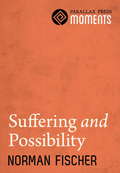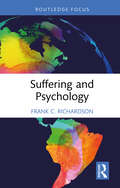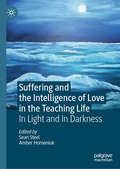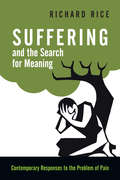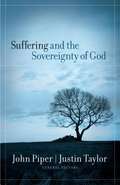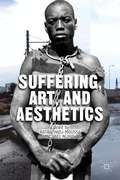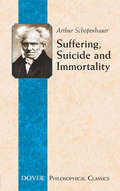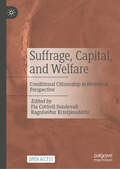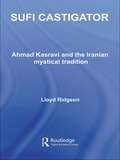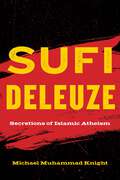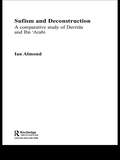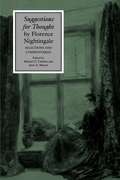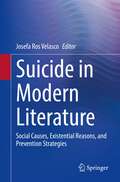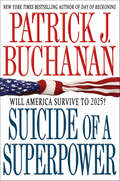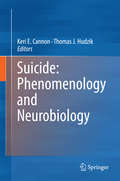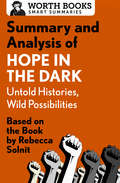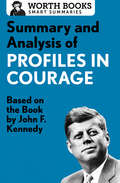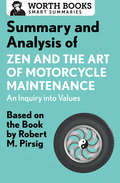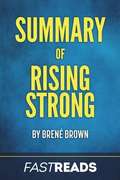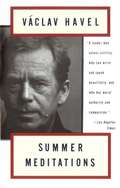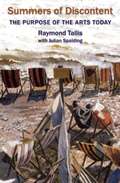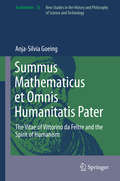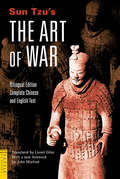- Table View
- List View
Suffering and Possibility
by Norman FischerSuffering and Possibility is part of the Parallax Press Moments series of short ebooks. It is a stand alone chapter from Solid Ground: Buddhist Wisdom for Difficult Times.
Suffering and Psychology
by Frank C. RichardsonSuffering and Psychology challenges modern psychology's concentration almost exclusively on eradicating pain, suffering, and their causes. Modern psychology and psychotherapy are motivated in part by a humane and compassionate desire to relieve many kinds of human suffering. However, they have concentrated almost exclusively on eradicating pain, suffering, and their causes. In doing so psychology perpetuates modern ideologies of individual human freedom and expanding instrumental control that foster worthy ideals but are distinctly limited and by themselves quite self-defeating and damaging in the long run. This book explores theoretical commitments and cultural ideals that deter the field of psychology from facing and dealing credibly with inescapable human limitations and frailties, and with unavoidable suffering, pain, loss, heartbreak, and despair. Drawing on both secular and spiritual points of view, this book seeks to recover ideals of character and compassion and to illuminate the possibility of what Jonathan Sacks terms "transforming suffering" rather than seeking mainly to eliminate, anesthetize, or defy these dark and difficult aspects of the human condition. Suffering and Psychology will be of interest to academic and professional psychologists and philosophers.
Suffering and the Intelligence of Love in the Teaching Life: In Light and In Darkness
by Sean Steel Amber HomeniukThis book shares insights drawn from the diverse voices of public school teachers, community outreach education workers, professors, writers, poets, artists, and musicians on suffering in school and the classroom. Teachers speak about their own encounters with and perceptions from suffering using critical-analytic textual works, as well as first-hand personally reflective accounts. By sharing their stories and reflections, the editors and contributors shed light upon the dark areas that often are not addressed in Teacher Training Programs, and that generally remain unaddressed and unacknowledged even as teachers become well-established as professionals in the field of education.
Suffering and the Search for Meaning: Contemporary Responses to the Problem of Pain
by Richard Riceme
Suffering and the Sovereignty of God
by John Piper Justin TaylorIn the last few years, 9/11, a tsunami, Hurricane Katrina, and many other tragedies have shown us that the vision of God in today's churches in relation to evil and suffering is often frivolous. Against the overwhelming weight and seriousness of the Bible, many Christians are choosing to become more shallow, more entertainment-oriented, and therefore irrelevant in the face of massive suffering. In Suffering and the Sovereignty of God, contributors John Piper, Joni Eareckson Tada, Steve Saint, Carl Ellis, David Powlison, Dustin Shramek, and Mark Talbot explore the many categories of God's sovereignty as evidenced in his Word. They urge readers to look to Christ, even in suffering, to find the greatest confidence, deepest comfort, and sweetest fellowship they have ever known.
Suffering, Art, and Aesthetics
by Michael Nijhawan Ratiba Hadj-MoussaHow do we conceptualize the relationship between suffering, art, and aesthetics from within the broader framework of social, cultural, and political thought today? This book brings together a range of intellectuals from the social sciences and humanities to speak to theoretical debates around the questions of suffering in art and suffering and art.
Suffering, Suicide and Immortality: Eight Essays from The Parerga
by Arthur Schopenhauer T. Bailey SaundersOne of the greatest philosophers of the nineteenth century, Arthur Schopenhauer is best known for his writings on pessimism. In this 1851 essay collection, he offers concise statements of the unifying principles of his thinking. Schopenhauer, unlike most philosophers, expressed himself in simple, direct terms. These essays offer an accessible approach to his main thesis, as stated in The World as Will and Representation.Schopenhauer's reasoning encompasses the influence of the Upanishads and Buddhist teachings, as well as the works of Plato and Kant. His philosophy had an enormous impact on contemporary philosophy and literature, and on subsequent thinkers such as Nietzsche, Freud, and Wittgenstein. Published toward the end of his life in a collection called Parerga und Paralipomena, these essays include "On the Sufferings of the World," "On the Vanity of Existence," "On Suicide," "Immortality: A Dialogue," "Further Psychological Observations," "On Education," "On Women," and "On Noise," plus "A Few Parables." They remain among Schopenhauer's most popular works, offering insights into his philosophy as a whole as well as the human condition.
Suffrage, Capital, and Welfare: Conditional Citizenship in Historical Perspective
by Fia Cottrell-Sundevall Ragnheiður KristjánsdóttirThis open access book examines disenfranchisement and voting barriers in ten self-governing and aspiring liberal democracies worldwide, before and after the introduction of so-called universal suffrage. Focusing on economic voting restrictions implemented through constitutional provisions and laws, it explores the various disqualifications that prevent people from voting. The notions of economic independence underpinning these restrictions have built and reinforced societal structures and power relations, particularly concerning class, gender, race, civil status, age, and education. Historically, voting rights have been celebrated as a symbol of inclusivity and equal citizenship. Yet, as contributors in this collection highlight, recent centennial celebrations of universal suffrage often depict it as a distinct milestone, overshadowing the voting restrictions that persisted post women’s suffrage. As democracy now faces new, concerted challenges, there is a compelling reason to revisit and question the narrative of the progression of democratic ideals.
Sufi Castigator: Ahmad Kasravi and the Iranian Mystical Tradition (Routledge Sufi Series #Vol. 19)
by Lloyd RidgeonSufi Castigator investigates the writings of Ahmad Kasravi, one of the foremost intellectuals in Iran. It studies his work within the context of Sufism in modern Iran and mystical Persian literature and includes translations of Kasravi’s writings. Kasravi provides a fascinating topic for those with interests in Sufism and Iranian studies as he attempted to produce a form of Iranian identity that he believed was compatible with the modern age and Iranian nationalism. His stress on reason and the de-mystification of religion caused him to repudiate Sufism and much of the Sufi literary heritage as backwards and believed it a reason for the weakness of modern Iran. Kasravi’s historical observations were weak, and his writings indicate that he was working towards pre-determined conclusions. However, his works are of significance because they contributed to a major discussion in the 1930s to 1940s about the ideal image and identity that Iranians should adopt. Despite the academic weaknesses of Kasravi’s works he had a profound effect on the next generation of thinkers. Sufi Castigator is stimulating and meticulously researched book and includes two lengthy translations of Kasravi’s works, Sufism and What does Hafez Say? and will appeal to scholars of middle eastern studies.
Sufi Deleuze: Secretions of Islamic Atheism
by Michael Muhammad Knight“There is always an atheism to be extracted from a religion,” Deleuze and Guattari write in their final collaboration, What Is Philosophy? Their claim that Christianity “secretes” atheism “more than any other religion,” however, reflects the limits of their archive. Theological projects seeking to engage Deleuze remain embedded within Christian theologies and intellectual histories; whether they embrace, resist, or negotiate with Deleuze’s atheism, the atheism in question remains one extracted from Christian theology, a Christian atheism. In Sufi Deleuze, Michael Muhammad Knight offers an intervention, engaging Deleuzian questions and themes from within Islamic tradition. Even if Deleuze did not think of himself as a theologian, Knight argues, to place Deleuze in conversation with Islam is a project of comparative theology and faces the challenge of any comparative theology: It seemingly demands that complex, internally diverse traditions can speak as coherent, monolithic wholes. To start from such a place would not only defy Islam’s historical multiplicity but also betray Deleuze’s model of the assemblage, which requires attention to not only the organizing and stabilizing tendencies within a structure but also the points at which a structure resists organization, its internal heterogeneity, and unpredictable “lines of flight.”A Deleuzian approach to Islamic theology would first have to affirm that there is no such thing as a universal “Islamic theology” that can speak for all Muslims in all historical settings, but rather a multiplicity of power struggles between major and minor forces that contest each other over authenticity, authority, and the making of “orthodoxy.” The discussions in Sufi Deleuze thus highlight Islam’s extraordinary range of possibilities, not only making use of canonically privileged materials such as the Qur’an and major hadith collections, but also exploring a variety of marginalized resources found throughout Islam that challenge the notion of a singular “mainstream” interpretive tradition. To say it in Deleuze’s vocabulary, Islam is a rhizome.
Sufism and Deconstruction: A Comparative Study of Derrida and Ibn 'Arabi (Routledge Studies in Religion #Vol. 6)
by Ian AlmondExaminung a series of common features in the works of Derrida and the Sufism of Ibn 'Arabi, considered to be one of the most influential figures in Islamic thought, the author addresses the significant absence of attention on the relationship between Islam and Derrida. Presenting a deconstructive perspective on Ibn 'Arabi, the book's features include:* the opposition to systematizing representations of God/reality/the text * a re-emphasis on the radical unthinkability of God and the text * a common conception of rational thought as restrictive, commodifying and ultimately illusory - and a subsequent appraisal of confusion as leading to a higher state of knowledge* a positive belief in the infinate interpretability of the text * a suspicion of represention - and an awareness of its semantic futility, along with a common, 'welcoming' affirmation of openness and errancy towards God and the text.This book will be essential reading for advanced students and academics of Religious studies, Arabic and Islamic studies and those interested in the work of Derrida and Ibn 'Arabi.
Suggestions for Thought by Florence Nightingale
by Michael D. Calabria Janet A. MacraeFlorence Nightingale is best known as the founder of modern nursing, a reformer in the field of public health, and a pioneer in the use of statistics. It is not generally known, however, that Nightingale was at the forefront of the religious, philosophical, and scientific though of her time. In a three-volume work that was never published, Nightingale presented her radical spiritual views, motivated by the desire to give those who had turned away from conventional religion an alternative to atheism. In this volume Michael D. Calabria and Janet A. Macrae provide the essence of Nightingale's spiritual philosophy by selecting and reorganizing her best-written treatments. The editors have also provided an introduction and commentary to set the work into a biographical, historical, and philosophical context.This volume illuminates a little-known dimension of Nightingale's personality, bringing forth the ideas that served as the guiding principles of her work. It is also an historical document, presenting the religious issues that were fiercely debated in the second half of the nineteenth century. In Suggestions for Thought, one has the opportunity to experience a great practical mind as it grapples with the most profound questions of human existence.
Suicide in Modern Literature: Social Causes, Existential Reasons, and Prevention Strategies
by Josefa Ros VelascoThis book analyzes the social and contextual causes of suicide, the existential and philosophical reasons for committing suicide, and the prevention strategies that modern fictional literature places at our disposal. They go through the review of Modern fictional literature, in the American and European geographical framework, following the rationales that modern literature based on fiction can serve the purpose of understanding better the phenomenon of suicide, its most inaccessible impulses, and that has the potential to prevent suicide.From the turn of the 20th century to the present, debates over the meaning of suicide became a privileged site for efforts to discover the reasons why people commit suicide and how to prevent this behavior. Since the French sociologist and philosopher Émile Durkheim published his study Suicide: A Study in Sociology in 1897, a reframing of suicide took place, giving rise to a flourishing group of researchers and authors devoting their efforts to understand better the causes of suicide and to the formation of suicide prevention organizations. A century later, we still keep on trying to reach such an understanding of suicide, the nature, and nuances of its modern conceptualization, to prevent suicidal behaviors.The question of what suicide means in and for modernity is not an overcome one. Suicide is an act that touches all of our lives and engages with the incomprehensible and unsayable. Since the turn of the millennium, a fierce debate about the state’s role in assisted suicide has been adopted. Beyond the discussion as to whether physicians should assist in the suicide of patients with unbearable and hopeless suffering, the scope of the suicidal agency is much broader concerning general people wanting to die.
Suicide of a Superpower: Will America Survive to 2025?
by Patrick J. BuchananAmerica is disintegrating. The "one Nation under God, indivisible" of the Pledge of Allegiance is passing away. In a few decades, that America will be gone forever. In its place will arise a country unrecognizable to our parents. This is the thrust of Pat Buchanan's Suicide of a Superpower, his most controversial and thought-provoking book to date.Buchanan traces the disintegration to three historic changes: America's loss of her cradle faith, Christianity; the moral, social, and cultural collapse that have followed from that loss; and the slow death of the people who created and ruled the nation. And as our nation disintegrates, our government is failing in its fundamental duties, unable to defend our borders, balance our budgets, or win our wars.How Americans are killing the country they profess to love, and the fate that awaits us if we do not turn around, is what Suicide of a Superpower is all about.
Suicide: Phenomenology and Neurobiology
by Keri E. Cannon Thomas J. HudzikThis book addresses the phenomenology, demographics, and neurobehavioral aspects of suicidal behavior and its risk factors, underscoring common neurobehavioral threads among different approaches which may underlie such extreme behavior. It additionally provides an overview of new approaches, such as imaging techniques to identify at-risk individuals or in response to drug treatment associated with suicidal behavior, neurodevelopmental approaches, genetic and epigenetic linkages to suicidal behavior, animal models of specific risk factors, as well as potential biomarkers being employed to help assess risk.
Summary and Analysis of Hope in the Dark: Based on the Book by Rebecca Solnit
by Worth BooksSo much to read, so little time? This brief overview of Hope in the Dark tells you what you need to know—before or after you read Rebecca Solnit’s book. Crafted and edited with care, Worth Books set the standard for quality and give you the tools you need to be a well-informed reader. This short summary and analysis of Hope in the Dark includes: Historical contextChapter-by-chapter overviewsProfiles of the main charactersDetailed timeline of eventsImportant quotes and analysisFascinating triviaGlossary of termsSupporting material to enhance your understanding of the original workAbout Hope in the Dark: Untold Histories, Wild Possibilities by Rebecca Solnit: Written in response to the 2004 US presidential election, and updated during the 2016 race, Rebecca Solnit’s Hope in the Dark is a call to action for people who find themselves despairing about the political climate of the world today. Hope in the Dark is a long essay that serves as a primer on social and environmental activism and uprisings from the mid-to-late 20th century to the present. Solnit uses this history of protesters, writers, and workers to argue that hope is the necessary catalyst for action. She insists that radicals and revolutionaries must hold onto hope in order to create a world more like the one they want to live in, even in the face of enormous obstacles, and especially in the face of uncertainty. The summary and analysis in this ebook are intended to complement your reading experience and bring you closer to a great work of nonfiction.
Summary and Analysis of Profiles in Courage: Based on the Book by John F. Kennedy (Smart Summaries)
by Worth BooksSo much to read, so little time? This brief overview of Profiles in Courage tells you what you need to know—before or after you read John F. Kennedy&’s book. Crafted and edited with care, Worth Books set the standard for quality and give you the tools you need to be a well-informed reader. This short summary and analysis of Profiles in Courage includes: Historical contextChapter-by-chapter overviewsProfiles of the main charactersDetailed timeline of key eventsImportant quotesFascinating triviaGlossary of termsSupporting material to enhance your understanding of the original work About Profiles in Courage by John F. Kennedy: John F. Kennedy&’s Profiles in Courage takes an in-depth look at eight US senators who displayed courage by going against their political party&’s platform and acting on integrity and convictions. These timeless stories of political courage and inner strength are no less poignant today than upon the book&’s original publication in 1955. The summary and analysis in this ebook are intended to complement your reading experience and bring you closer to a great work of nonfiction.
Summary and Analysis of Zen and the Art of Motorcycle Maintenance: Based on the Book by Robert M. Pirsig (Smart Summaries)
by Worth BooksSo much to read, so little time? This brief overview of Zen and the Art of Motorcycle Maintenance tells you what you need to know—before or after you read Robert M. Pirsig&’s book. Crafted and edited with care, Worth Books set the standard for quality and give you the tools you need to be a well-informed reader. This short summary and analysis of Zen and the Art of Motorcycle Maintenance: An Inquiry into Values includes: Historical contextChapter-by-chapter overviewsCast of charactersThemes and symbolsImportant quotesFascinating triviaGlossary of termsSupporting material to enhance your understanding of the original workAbout Zen and the Art of Motorcycle Maintenance by Robert M. Pirsig: Zen and the Art of Motorcycle Maintenance is three books in one, including the author&’s account of a transcontinental journey, his struggle to reconcile both halves of an identity fragmented by his own mental illness, and a rumination on Eastern versus Western philosophy. Now, more than forty years since its original release, Zen and the Art of Motorcycle Maintenance has become a modern classic—the kind of book that challenges readers to step outside of their everyday thoughts and consider some of life&’s most profound questions through the entertaining lens of a father-son trip. The summary and analysis in this ebook are intended to complement your reading experience and bring you closer to a great work of nonfiction.
Summary of Rising Strong
by Brene Brown FastreadsDon't miss out on the fresh perspective of bestselling author and social scientist Brené Brown in this summary of her book, "Rising Strong: The Reckoning, The Rumble, The Revolution." This FastReads Summary contains full chapter synopses, key takeaways and analysis to help you quickly understand Brown's insight and turn your own vulnerability into strength today.
Summer Meditations
by Paul Wilson Václav Havel<p>In a book written while he was president of Czechoslovakia, Vaclav Havel combines the same powerful eloquence, moral passion, and abiding wisdom that informed his writing as a dissident and playwright, with a candor unprecedented from one with the broad perspective and infinite responsibility of governing a country. <p>Havel, now president of the Czech Republic, addresses the legacy of Communism as the euphoria of the Velvet Revolution gives way to a more problematic reality. Yet even as he grapples with the challenges of political change, he affirms his belief in a politics motivated by moral responsibility; in an economy tempered by compassion; and in the central roles of art and culture in the transformation of society. Summer Meditations is not only a timely and necessary testament of events in Eastern Europe but a profound reflection upon the nature and practice of politics and a stirring call for morality, civility, and openness in public life throughout the world.</p>
Summer of Hate: Charlottesville, USA
by Hawes SpencerIn August 2017, violence erupted in Charlottesville, Virginia, during two days of demonstrations by white supremacists, neo-Nazis, and counterprotesters, including members of antifa and Black Lives Matter. Ostensibly motivated by the city’s plans to remove Confederate statues from two public parks, members of the alt-right descended first on the University of Virginia and then, disastrously, on the city’s downtown. As these violent and ultimately deadly events gripped the attention of the nation, extensive coverage in both mainstream and fringe media promulgated competing narratives. Summer of Hate is the investigative journalist Hawes Spencer’s unbiased, probing account of August 11 and 12. Telling the story from the perspectives of figures on all sides of the demonstrations, Spencer, who reported from Charlottesville for the New York Times, carefully recreates what happened and why. Focusing on individuals including activists, city councilors, faith leaders, and the police, Spencer creates an objective, panoramic narrative that renders these dramatic events, and the ongoing conflicts underlying them, in all their complexity.
Summers of Discontent
by Raymond Tallis Julian SpaldingSince the time of the ancient Greeks, philosophers have pondered the nature and purpose of the arts, but artists have gone on making them and audiences enjoying them regardless of these musings. None of their theories have met with universal or even popular acceptance. But here is theory that places the arts--all the arts--firmly and squarely within everyone's everyday experiences.Summers of Discontent goes to the heart of the arts. It's an examination of why artists create them in the first place and why we all feel the need for them. Raymond Tallis thinks the arts spring from our inability as humans fully to experience our experiences; from our hunger for a more rounded, more complete sense of the world.Tallis's thesis is original and fresh, down-to-earth and life-enhancing. Above all it is practical and intelligible. It will inspire anyone who feels the creative urge today, or anyone who wants to understand why and how the arts enrich their lives and those of others.Raymond Tallis is a leading academic doctor, poet, philosopher, and cultural critic. Author of more than twenty books, he was until his retirement professor of geriatric medicine at the University of Manchester.Julian Spalding was director, successively of Sheffield and Manchester Art Galleries, and latterly of the Gallery of Modern Art in Glasgow. He has written over a dozen books on art historical subjects and curated many exhibitions.
Summus Mathematicus et Omnis Humanitatis Pater
by Anja-Silvia GoeingThis book revises the picture of the teacher and educator of princes, Vittorino Rambaldoni da Feltre (c. 1378, Feltre -- 1446, Mantua), taking a completely new approach to show his work and life from the individual perspectives created by his students and contemporaries. From 1423 to 1446, Vittorino da Feltre was in charge of a school in Mantua, where his students included not only the offspring of Italy's princes, but also the first generation of authors dealing with books in print. Among his students were historians like Bartolomeo Sacchi (named Platina), who wrote an extensive history of the popes, and mathematicians like Jacopo Cassiano (Cremonensis), who translated the work of Archimedes from Greek into Latin. Vittorino is still regarded as the educationalist of Italian Renaissance humanism per sé. This work not only contributes to the study of the history of Italian humanist institutions, it also uses available sources to demonstrate the development of a new attitude to education in Italy.
Sun Tzu's The Art of War: Bilingual Edition Complete Chinese and English Text
by Sun Tzu Lionel Giles John MinfordSun Tzu's The Art of War has been the premier manual of Chinese military strategy for the past two millennia and, as thousands of Asian businessmen can attest, this classic work is as applicable to the corporate world as it is to the battlefield.<P><P>This is the only contemporary edition of the classic Lionel Giles translation to contain all of the translator's original notes, to help you better understand Sun Tzu's powerful maxims and apply them in your daily life. John Minford's foreword brings insights to this classic text and its timeless relevance to the modern world.This edition also marks the first time Giles' translation has been converted to Hanyu Pinyin--the standard Chinese romanization system. Additionally, the book contains the full Chinese language version of the text, along with Giles' extensive notes, with their original Chinese text references to the historical Chinese commentators, making this edition a treasure to military scholars, martial artists, and those planning to use Sun Tzu's strategies to conquer the business world.Sun Tzu's The Art of War will arm you with the knowledge that has allowed those who have studied this classic to gain victory--and often, total domination--over those who remain ignorant of its sage advice.
Sun-Tzu: The First English Translation Incorporating the Recently Discovered Yin-ch'ueh-shan Texts (Classics Of Ancient China Ser.)
by Roger T. AmesThe most widely read military classic in human history, newly translated and revised in accordance with newly discovered materials of unprecedented historical significance. Fluid, crisp and rigorously faithful to the original, this new text is destined to stand as the definitive version of this cornerstone work of Classical Chinese. Of compelling importance not only to students of Chinese history and literature, but to all readers interested in the art or the philosophy of war.
